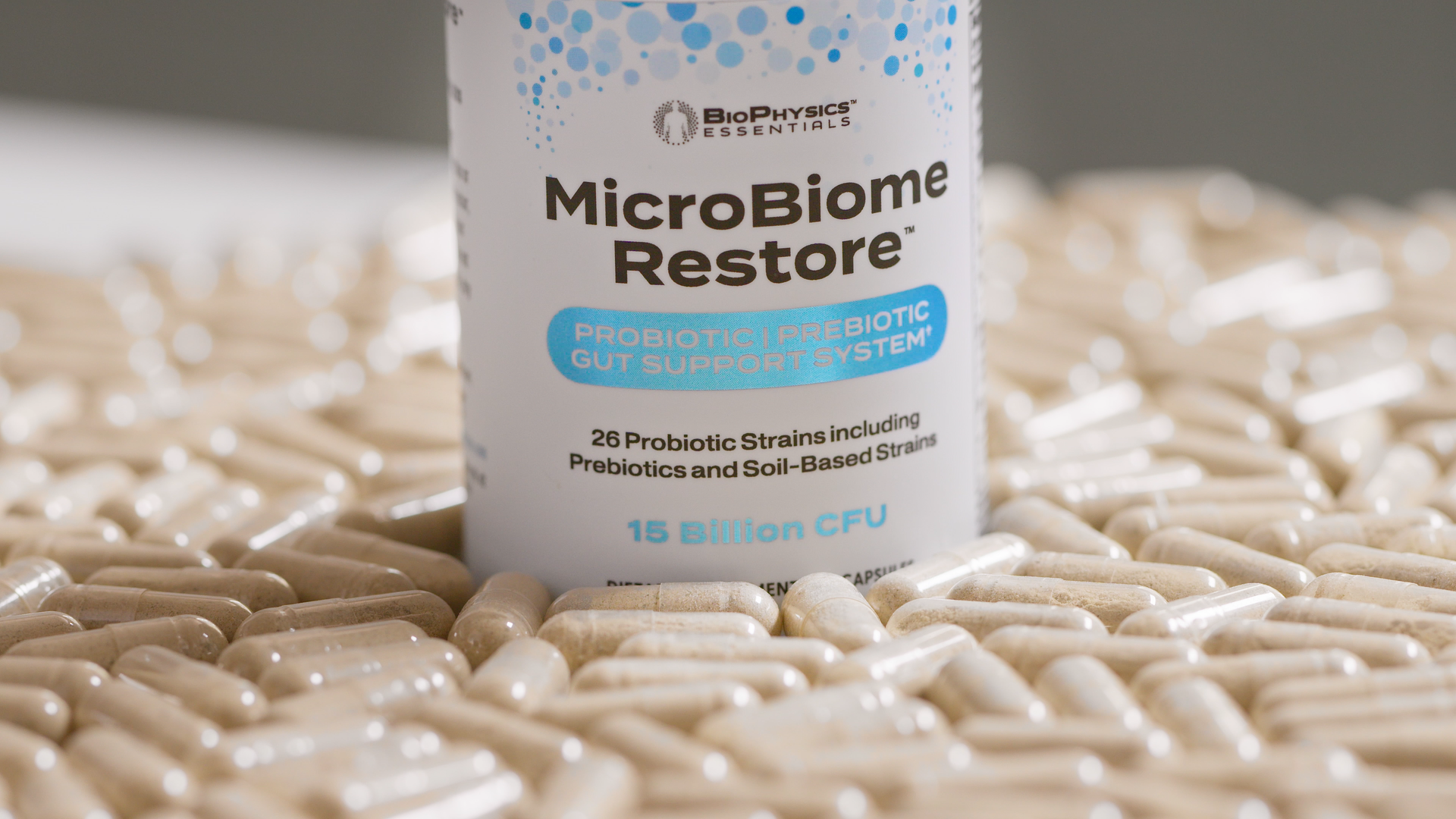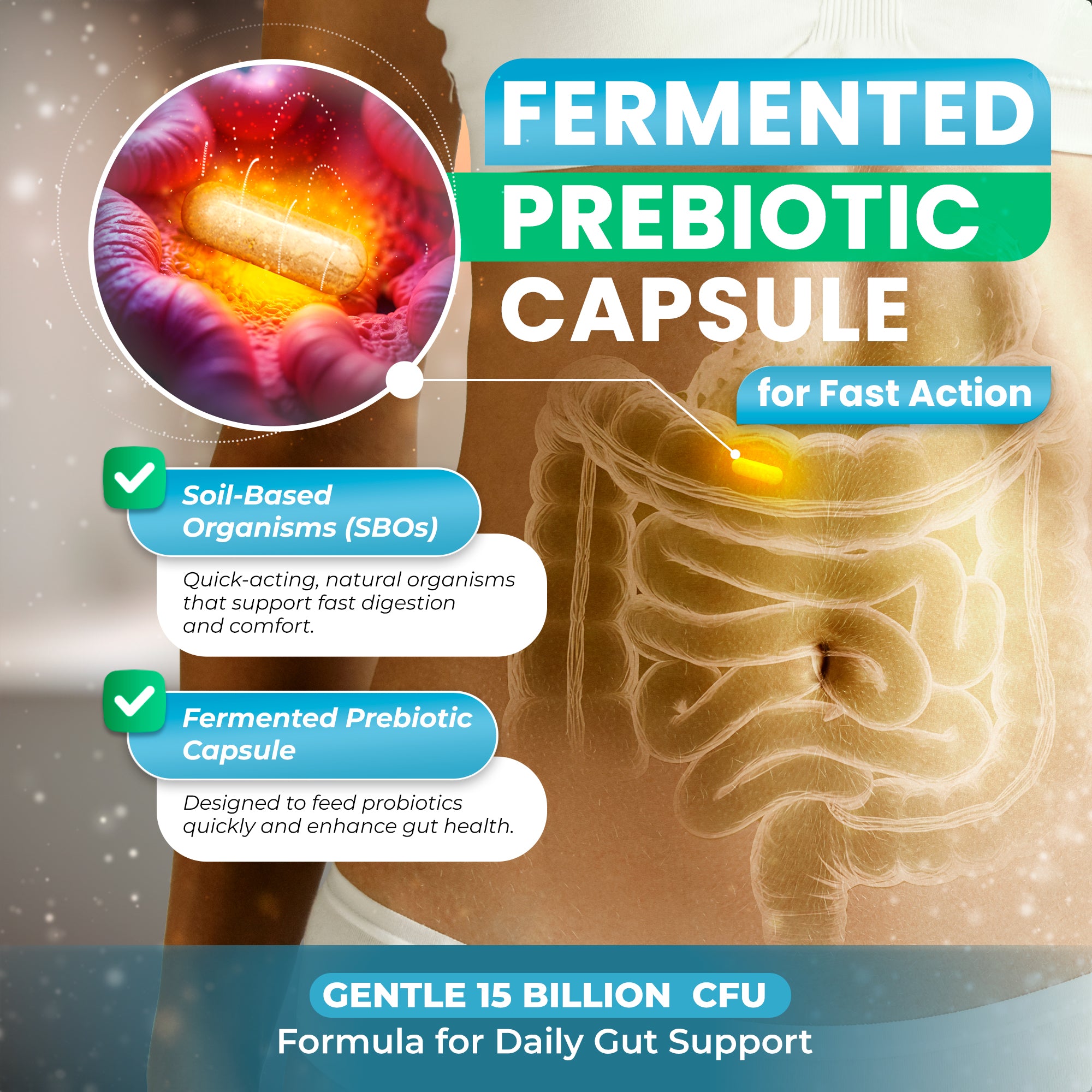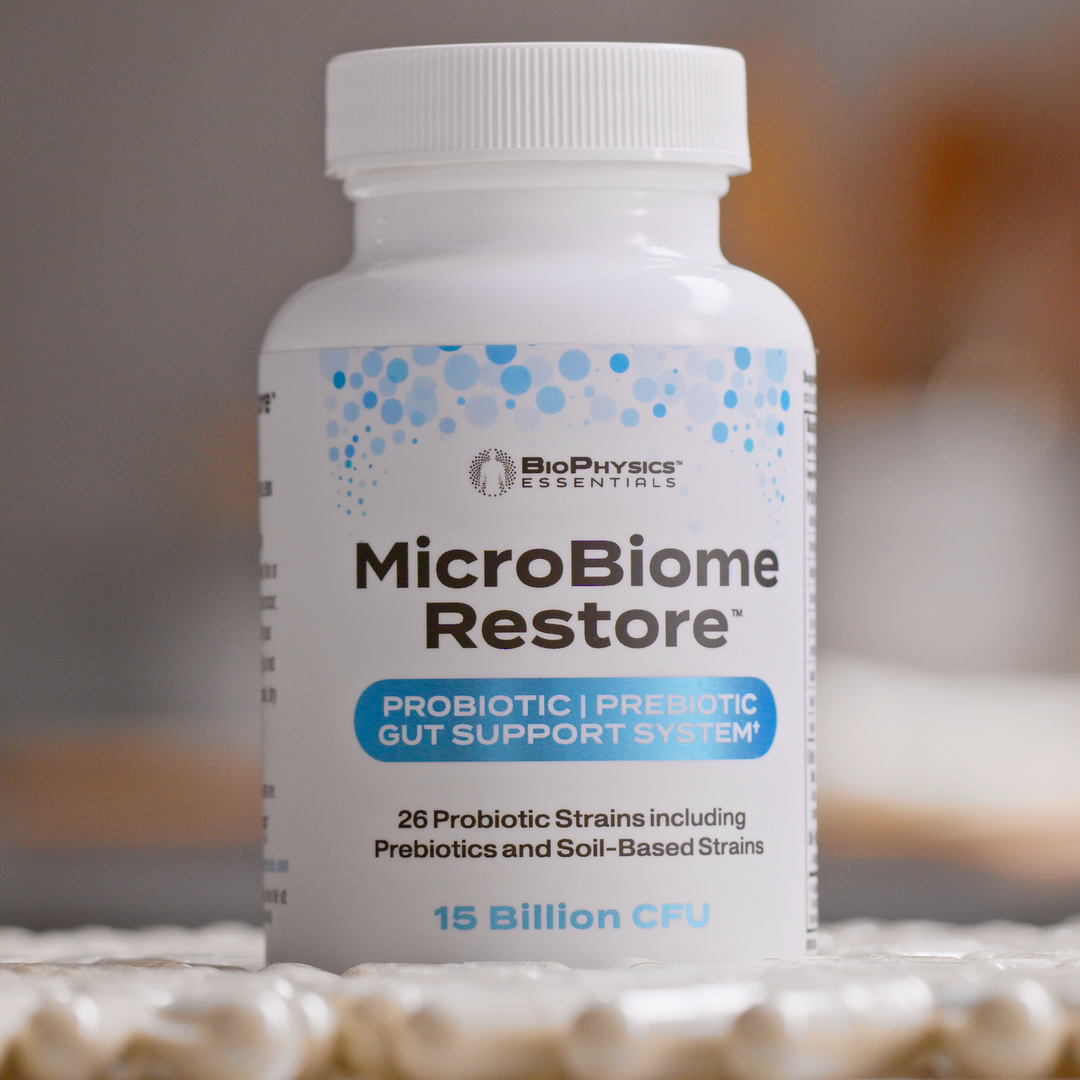Introduction
Maitake mushroom (Grifola frondosa) has captivated traditional Eastern medicine practitioners for centuries with its distinctive appearance and therapeutic properties. Known colloquially as the "dancing mushroom" or "hen-of-the-woods," this edible polypore fungus grows in overlapping clusters at the base of hardwood trees—particularly oak, elm, and maple—throughout Japan, China, and North America. The name "maitake" translates to "dancing mushroom" in Japanese, reflecting the joy traditionally expressed upon discovering these prized fungi in the wild.
While maitake's culinary applications are well-established, emerging scientific research has illuminated its remarkable potential for supporting digestive wellness and gut microbiome balance. The mushroom's bioactive compounds—particularly beta-glucans and polysaccharides—demonstrate significant prebiotic properties that selectively nourish beneficial intestinal bacteria while producing health-promoting metabolites.[1] These mechanisms position maitake as more than a nutritious food: it functions as a functional ingredient with documented effects on gut microbial composition and metabolic health.[2]
This comprehensive guide examines the scientific evidence behind maitake mushroom's gut-healing capabilities, exploring how its unique nutritional profile supports digestive function, intestinal barrier integrity, and microbiome diversity. We'll investigate the specific bioactive compounds responsible for these effects, review clinical and experimental research, and discuss practical applications for incorporating this medicinal mushroom into evidence-based wellness strategies.
Key Takeaways
|
Nutritional Profile and Bioactive Compounds
Understanding maitake's gut health benefits requires examining its complex nutritional composition. Unlike many commonly consumed mushrooms, maitake boasts an exceptional concentration of bioactive polysaccharides alongside essential nutrients that collectively support digestive function and microbial balance.
Primary Bioactive Components
Beta-Glucans and Polysaccharides: Maitake contains significant quantities of beta-1,3/1,6-glucans—complex carbohydrate structures that resist digestion in the upper gastrointestinal tract.[8] These polysaccharides reach the colon intact, where they serve as substrates for beneficial bacterial fermentation. The specific branching pattern of maitake's beta-glucans distinguishes them from cereal-derived glucans, with research indicating that fungal beta-glucans exhibit stronger immunomodulatory and prebiotic effects.[9]
Studies characterizing maitake extracts report beta-glucan content ranging from 20-40% of dry weight, with the exact concentration varying based on cultivation methods and extraction techniques.[10] The polysaccharide fraction also includes other prebiotic fibers such as arabinogalactans and heteropolysaccharides that contribute synergistically to gut health outcomes.
Protein and Amino Acids: Maitake provides all essential amino acids, with protein comprising 13-21% of dry weight.[11] These amino acids serve as building blocks for digestive enzymes and contribute to maintaining the structural integrity of the intestinal epithelial barrier. The mushroom's protein content includes proteoglycans—complex molecules combining proteins with polysaccharide chains—that demonstrate immune-enhancing properties relevant to gut-associated lymphoid tissue function.
B-Vitamin Complex: Maitake is particularly rich in niacin (vitamin B3) and riboflavin (vitamin B2), vitamins essential for cellular energy metabolism and the production of digestive enzymes. These B vitamins support the metabolic activity of both human enterocytes and beneficial gut bacteria, facilitating nutrient absorption throughout the gastrointestinal tract.
Trace Minerals: The mushroom contains copper, potassium, and phosphorus—minerals that support enzyme activity, fluid balance, and cellular communication in the digestive system. These trace elements play cofactor roles in numerous enzymatic reactions essential for both human digestion and bacterial fermentation processes.
Bioactive Phenolic Compounds: Beyond polysaccharides, maitake contains phenolic compounds including flavonoids that exhibit antioxidant and anti-inflammatory activities.[12] These phytochemicals contribute to maitake's ability to modulate inflammatory responses in the gut environment.
Prebiotic Effects on Gut Microbiota Composition
The defining characteristic of a prebiotic is its ability to selectively stimulate the growth and activity of beneficial intestinal bacteria. Maitake mushroom extract has demonstrated robust prebiotic properties in both in vitro fermentation studies and clinical trials.[3]
Stimulation of Beneficial Bacteria
A controlled study published in ACS Omega employed a pH-controlled in vitro colon model inoculated with human fecal microbiota to evaluate maitake's prebiotic potential.[3] Results demonstrated that maitake extract significantly promoted Bifidobacterium proliferation comparable to fructo-oligosaccharides (FOS)—a well-established prebiotic benchmark—while simultaneously inhibiting growth of Clostridium histolyticum, a bacterial group commonly associated with gut dysbiosis.
More recent research published in PLoS ONE examined maitake's effects on a reconstructed minimal human gut microbiota model.[4] Administration of maitake extract combined with specific probiotic strains (Lactobacillus and Bifidobacterium genera) generated positive modulation of the bacterial community, with qPCR analyses revealing prominence of beneficial strains including Lactiplantibacillus plantarum and Bifidobacterium animalis subsp. lactis after 48 hours of fermentation.
Inhibition of Pathogenic Species
Equally important to stimulating beneficial bacteria is suppressing potentially harmful species. The selective fermentation of maitake polysaccharides creates an acidic colonic environment through SCFA production, which inhibits the growth of pathogenic bacteria while favoring acid-tolerant beneficial species.[3] This ecological shift helps maintain a balanced microbiome resistant to dysbiotic changes and pathogen colonization.
Enhancement of Microbial Diversity
Emerging evidence suggests maitake consumption influences not just specific bacterial populations but overall microbiome diversity—a key marker of gut health. While direct human trials measuring diversity metrics remain limited, animal studies demonstrate that mushroom polysaccharides including those from Grifola frondosa can increase microbial richness and evenness in the gut ecosystem.[13] This diversity enhancement may contribute to improved metabolic function, immune regulation, and resistance to inflammatory conditions.
Short-Chain Fatty Acid Production
The fermentation of maitake polysaccharides by colonic bacteria yields short-chain fatty acids (SCFAs)—small organic compounds that serve as crucial mediators of gut health. The three primary SCFAs—acetate, propionate, and butyrate—collectively account for over 95% of SCFAs produced in the human colon.[14]
Mechanisms of SCFA Production from Maitake
Gas chromatography-mass spectrometry (GC-MSD) analysis of maitake fermentation samples revealed significant production of multiple SCFAs over 48-hour incubation periods.[4] Detected metabolites included lactic acid, succinic acid, valeric acid, and importantly, the three major SCFAs. The SCFA profile generated from maitake fermentation demonstrates the mushroom's capacity to serve as substrate for diverse bacterial metabolic pathways.
Physiological Roles of SCFAs in Gut Health
Butyrate: Often considered the most important SCFA for intestinal health, butyrate serves as the primary energy source for colonocytes (intestinal epithelial cells).[15] Beyond its metabolic role, butyrate enhances intestinal barrier function by upregulating tight junction proteins, reduces inflammation through histone deacetylase (HDAC) inhibition, and promotes regulatory T cell differentiation.[16] These actions collectively support gut barrier integrity and immune tolerance.
Propionate: Primarily absorbed and metabolized in the liver, propionate influences gluconeogenesis and lipid metabolism.[17] Recent research has highlighted propionate's role in satiety regulation through interactions with enteroendocrine cells that secrete peptide YY (PYY) and glucagon-like peptide-1 (GLP-1).[18], suggesting metabolic benefits extending beyond the gut itself.
Acetate: The most abundant SCFA in the colon, acetate enters systemic circulation and participates in peripheral metabolism, including cholesterol synthesis regulation.[19] Acetate also demonstrates anti-inflammatory properties through activation of GPR43 receptors on immune cells.[20]
Clinical Significance
The elevated production of SCFAs observed with maitake fermentation translated to functional benefits in cell culture studies.[4] SCFA-containing fermentation supernatants enhanced expression of antioxidant genes (SOD1 and NQO1) in intestinal epithelial cells and stimulated production of anti-inflammatory interleukin-10 (IL-10) from peripheral blood mononuclear cells. These findings suggest maitake's fermentation products actively promote an anti-inflammatory, tolerogenic intestinal environment.
Beta-Glucan Immune Modulation and Gut Health
The immune-modulatory effects of maitake beta-glucans represent a crucial mechanism by which the mushroom supports gut health. Approximately 70% of the human immune system resides in gut-associated lymphoid tissue (GALT), making immune regulation particularly relevant for digestive wellness.
Receptor Recognition and Cellular Activation
Beta-glucans interact with pattern recognition receptors (PRRs) on immune cells, particularly Dectin-1, complement receptor 3 (CR3), and toll-like receptors (TLR-2/6).[6] This recognition triggers signaling cascades that activate dendritic cells, macrophages, neutrophils, monocytes, and natural killer cells—collectively enhancing both innate and adaptive immune responses.
The specific beta-1,3/1,6 branching structure found in maitake determines the strength and nature of immune activation.[21] Fungal beta-glucans with this configuration demonstrate particularly potent immunomodulatory activity compared to linear beta-glucans from cereals, explaining maitake's traditional use in immune support applications.
Balancing Immune Responses in the Gut
Importantly, maitake beta-glucans don't simply stimulate immunity—they modulate it. This distinction is crucial for gut health, where the immune system must balance tolerance of commensal bacteria and dietary antigens with defensive responses against pathogens.[22] Research demonstrates that maitake-derived compounds can simultaneously enhance protective immunity while promoting anti-inflammatory IL-10 production.[4], supporting immune homeostasis rather than indiscriminate activation.
Implications for Intestinal Inflammation
Experimental studies have documented maitake's capacity to alleviate intestinal inflammation.[5] A study published in Experimental & Molecular Medicine found that Grifola frondosa water extract suppressed tumor necrosis factor-alpha (TNF-α) production and its downstream signaling pathways in models of intestinal inflammation. This anti-inflammatory mechanism may prove relevant for managing conditions characterized by excessive gut inflammation, such as inflammatory bowel disease or irritable bowel syndrome.
Anti-Inflammatory and Antioxidant Properties
Chronic low-grade inflammation in the gastrointestinal tract contributes to numerous digestive disorders and systemically to metabolic dysfunction. Maitake's anti-inflammatory and antioxidant compounds offer potential therapeutic value for maintaining gut homeostasis.
Anti-Inflammatory Mechanisms
Research evaluating maitake constituents demonstrated that compounds isolated from the fruiting body exhibited anti-inflammatory activity comparable to nonsteroidal anti-inflammatory drugs (NSAIDs) including aspirin, ibuprofen, and celecoxib.[12] The mechanism involves inhibition of cyclooxygenase (COX) enzymes—specifically both COX-1 and COX-2—which catalyze the production of pro-inflammatory prostaglandins.
Additional pathways include suppression of pro-inflammatory cytokines such as interleukin-6 (IL-6) and tumor necrosis factor-alpha (TNF-α), alongside enhanced production of anti-inflammatory IL-10.[4] These dual mechanisms—reducing inflammatory mediators while promoting anti-inflammatory signals—create a balanced approach to inflammation management particularly relevant for the gut environment.
Oxidative Stress Protection
Maitake demonstrates robust antioxidant activity through multiple mechanisms.[7] Studies measuring antioxidant gene expression in intestinal epithelial cells exposed to maitake fermentation products revealed significant upregulation of superoxide dismutase 1 (SOD1) and NAD(P)H quinone oxidoreductase 1 (NQO1)—two critical antioxidant enzymes.[4]
This antioxidant protection proves particularly important in the intestinal environment, where reactive oxygen species (ROS) generated during inflammatory responses can damage the epithelial barrier and contribute to increased intestinal permeability ("leaky gut"). By enhancing endogenous antioxidant defenses, maitake helps maintain the structural and functional integrity of the intestinal lining.
Support for Intestinal Barrier Function
Preliminary research investigating functional ingredients for treating intestinal barrier dysfunction found that maitake mushrooms, when incorporated into fermented yogurt formulations, helped maintain tight junction integrity in cell culture models of inflammation-induced barrier disruption.[23] While these findings require validation in human trials, they suggest maitake may actively support the physical barrier separating intestinal contents from systemic circulation—a fundamental aspect of gut health.
Metabolic and Systemic Health Benefits
Beyond direct effects on gut microbiota and intestinal function, maitake demonstrates metabolic benefits that may arise partly through gut-mediated mechanisms.
Glucose Metabolism and Insulin Sensitivity
Traditional use of maitake for managing blood sugar has found support in modern research. Studies demonstrate that specific fractions from Grifola frondosa improve glucose tolerance and enhance insulin sensitivity in diabetic animal models.[24] The mechanisms appear multifaceted, involving direct effects on glucose transporters, modulation of metabolic enzymes, and potentially through gut microbiome-mediated pathways.
Recent evidence suggests that SCFAs produced from prebiotic fiber fermentation—including those generated from maitake polysaccharides—contribute to improved insulin sensitivity and glucose homeostasis.[25] This highlights how maitake's gut health benefits may translate to systemic metabolic advantages.
Lipid Metabolism
Beta-glucans from various sources, including mushrooms, have demonstrated cholesterol-lowering effects.[26] Proposed mechanisms include binding bile acids in the intestinal lumen (preventing their reabsorption and forcing hepatic synthesis from cholesterol), SCFA-mediated inhibition of hepatic cholesterol synthesis, and direct effects on lipid absorption. While human clinical trials specifically evaluating maitake's lipid effects remain limited, the mechanistic evidence and animal studies suggest potential cardiovascular benefits mediated partly through gut interactions.
Synergistic Combinations: Maitake with Probiotics and Other Prebiotics
The concept of synbiotics—combinations of probiotics and prebiotics—recognizes that optimal gut health often requires both introducing beneficial bacteria and providing substrates to support their growth and activity. Maitake exemplifies an ideal prebiotic component in synbiotic formulations.
Enhanced Probiotic Efficacy
Research demonstrates that maitake extract combined with probiotic consortia generates superior outcomes compared to either component alone.[4] The study found that the synergistic combination enhanced bacterial fermentation activity, increased SCFA production, and amplified beneficial effects on intestinal and immune cells. This synergy suggests that maitake doesn't merely provide calories for bacterial growth but specifically supports the metabolic activities that generate health-promoting compounds.
Complementary Prebiotic Synergy
Combining maitake with other prebiotic fibers creates additional benefits through substrate diversity. Different prebiotic compounds are fermented by distinct bacterial groups at varying rates and locations throughout the colon. Acacia senegal gum, for instance, demonstrates particularly high fermentability in the distal colon, while inulin fermentation occurs primarily in the proximal colon.[27] Including multiple prebiotic sources ensures comprehensive support for beneficial bacteria throughout the entire large intestine.
Practical Application in Formulated Products
For individuals seeking comprehensive gut support, formulations combining maitake with diverse probiotic strains and complementary prebiotics offer an evidence-based approach. Products like MicroBiome Restore apply these principles by pairing maitake mushroom with 26 probiotic strains and additional organic prebiotics including acacia senegal, fig fruit, and sea vegetables. This comprehensive strategy addresses gut health through multiple complementary mechanisms simultaneously.
Safety, Tolerability, and Quality Considerations
Maitake mushroom boasts an extensive history of culinary and medicinal use with an excellent safety profile. No significant adverse effects have been associated with maitake consumption in traditional use or modern clinical trials.[28]
Clinical Safety Evidence
Human trials administering maitake extracts in various formulations have reported minimal side effects. The most commonly reported experiences are mild gastrointestinal symptoms—typically increased flatulence or changes in bowel frequency—that resolve as the microbiome adapts to increased fiber intake. These transient effects are characteristic of prebiotic consumption generally and typically diminish with continued use.
Potential Contraindications and Interactions
While maitake is generally safe, certain considerations merit attention:
- Blood Sugar Regulation: Given maitake's effects on glucose metabolism, individuals taking hypoglycemic medications should monitor blood sugar levels, as the mushroom may enhance medication effects.[24]
- Immune Modulation: Individuals with autoimmune conditions or those taking immunosuppressive medications should consult healthcare providers before using concentrated maitake supplements, as the mushroom's immune-enhancing properties could theoretically affect treatment outcomes.
- Surgical Procedures: Some evidence suggests maitake may influence blood clotting.[29] Discontinuing maitake supplements 2-3 weeks before scheduled surgery represents a prudent precaution.
Quality and Sourcing
The efficacy and safety of maitake products depend significantly on sourcing and processing. Key quality indicators include:
- Organic Certification: Ensures absence of pesticides and adherence to quality cultivation standards
- Fruiting Body vs. Mycelium: Fruiting bodies (the visible mushroom) generally contain higher concentrations of bioactive polysaccharides compared to mycelium (the underground fungal network)
- Extraction Methods: Hot water extraction typically yields higher concentrations of water-soluble polysaccharides, while alcohol extraction captures different compound classes. Dual extraction methods capture the full spectrum of bioactive compounds.
- Beta-Glucan Content: Quality supplements should specify beta-glucan concentration and verify through independent testing
Practical Applications and Dosing Considerations
Maitake can be incorporated into health protocols through various approaches, from culinary use to concentrated supplements.
Culinary Applications
Fresh or dried maitake mushrooms offer nutritional and prebiotic benefits when included in the diet. The mushrooms can be sautéed, roasted, added to soups and stews, or used as a meat substitute in various dishes. While culinary doses provide beneficial compounds, they typically deliver lower concentrations of beta-glucans compared to extracted supplements.
Supplemental Dosing
Clinical and experimental research has employed varying doses depending on the extract concentration and intended outcomes:
- General Gut Health Support: 1-3 grams daily of maitake extract standardized to 20-30% beta-glucans
- Intensive Support: 3-5 grams daily of extract, often divided into multiple doses
- Whole Mushroom Powder: 4-8 grams daily to achieve effects comparable to lower doses of concentrated extracts
These ranges represent general guidelines extrapolated from research protocols. Individual needs may vary, and consultation with qualified healthcare providers helps optimize personal protocols.
Timing and Consistency
Prebiotic effects require consistent intake to establish and maintain beneficial microbial changes. Studies demonstrating microbiome modulation typically employed daily administration over periods of 2-8 weeks.[3] Benefits accumulate with regular use rather than occasional supplementation.
Future Research Directions
While existing evidence supports maitake's gut health benefits, several areas warrant further investigation:
- Long-Term Human Trials: Most human studies have been relatively short-term. Extended trials examining sustained effects on microbiome composition, digestive symptoms, and metabolic markers would strengthen clinical applications.
- Mechanistic Studies: Deeper investigation into the specific bacterial species and metabolic pathways involved in maitake polysaccharide fermentation would enable more targeted therapeutic strategies.
- Individual Variability: Understanding why some individuals respond more strongly to prebiotic interventions than others could lead to personalized gut health protocols.
- Clinical Applications: Controlled trials evaluating maitake's efficacy for specific digestive conditions—inflammatory bowel disease, irritable bowel syndrome, metabolic syndrome—would expand evidence-based clinical use.
- Synbiotic Optimization: Systematic studies identifying which probiotic strains pair most effectively with maitake prebiotics could enhance product formulation.
Conclusion
Maitake mushroom (Grifola frondosa) represents a scientifically validated functional food with multifaceted benefits for gut health. The mushroom's rich polysaccharide content—particularly beta-glucans—functions as a prebiotic that selectively nourishes beneficial intestinal bacteria while generating health-promoting metabolites including short-chain fatty acids. Beyond these prebiotic effects, maitake demonstrates anti-inflammatory, antioxidant, and immune-modulating properties that collectively support intestinal barrier integrity, microbial balance, and systemic wellness.
The convergence of traditional use and modern scientific investigation validates maitake's role in evidence-based gut health strategies. Whether consumed as a culinary ingredient or concentrated supplement—particularly when combined with complementary probiotics and prebiotics—maitake offers a natural, well-tolerated approach to supporting digestive function and microbiome health.
As research continues to illuminate the intricate relationships between diet, gut microbiota, and health outcomes, maitake mushroom stands out as a promising tool for those seeking to optimize their digestive wellness through evidence-backed nutritional interventions.
References
- Cattaneo, L., Cirlini, M., Gatti, M., & Galaverna, G. (2021). Prebiotic Effect of Maitake Extract on a Probiotic Consortium and Its Action after Microbial Fermentation on Colorectal Cell Lines. Nutrients, 13(11), 4029. https://pmc.ncbi.nlm.nih.gov/articles/PMC8617840/
- Niego, A. G. T., Rapior, S., Thongklang, N., Raspé, O., Jaidee, W., Lumyong, S., & Hyde, K. D. (2024). Unveiling the full spectrum of maitake mushrooms: A comprehensive review of their medicinal, therapeutic, nutraceutical, and cosmetic potential. Heliyon, 10(9), e30254. https://www.cell.com/heliyon/fulltext/S2405-8440(24)06285-6
- Muhamad, N. A., Yusoff, F. M., Gimbun, J., & Manap, M. Y. A. (2021). Manipulation of Gut Microbiota Using Acacia Gum Polysaccharide. ACS Omega, 6(27), 17782–17797. https://pubs.acs.org/doi/10.1021/acsomega.1c00302
- De Giani, A., Perillo, F., Baeri, A., Finazzi, M., Facciotti, F., & Di Gennaro, P. (2024). Positive modulation of a new reconstructed human gut microbiota by Maitake extract helpfully boosts the intestinal environment in vitro. PLoS ONE, 19(4), e0301822. https://journals.plos.org/plosone/article?id=10.1371/journal.pone.0301822
- Lee, J. S., Park, S. Y., Thapa, D., Choi, M. K., Chung, I. M., Park, Y. J., Yong, C. S., & Kim, J. A. (2010). Grifola frondosa water extract alleviates intestinal inflammation by suppressing TNF-alpha production and its signaling. Experimental & Molecular Medicine, 42(2), 143-154. https://pubmed.ncbi.nlm.nih.gov/20054231/
- Vannucci, L., Krizan, J., Sima, P., Stakheev, D., Caja, F., Rajsiglova, L., Horak, V., & Saieh, M. (2023). β-glucans: a potential source for maintaining gut microbiota and the immune system. Frontiers in Nutrition, 10, 1143682. https://www.frontiersin.org/journals/nutrition/articles/10.3389/fnut.2023.1143682/full
- Muszynska, B., Grzywacz-Kisielewska, A., Kala, K., & Gdula-Argasinska, J. (2018). Anti-inflammatory properties of edible mushrooms: A review. Food Chemistry, 243, 373-381. https://www.sciencedirect.com/science/article/abs/pii/S1756464618300768
- Vetvicka, V., & Vetvickova, J. (2021). Edible Mushrooms and Beta-Glucans: Impact on Human Health. Nutrients, 13(7), 2427. https://pmc.ncbi.nlm.nih.gov/articles/PMC8308413/
- Murphy, E. J., Rezoagli, E., Major, I., Rowan, N. J., & Laffey, J. G. (2020). β-Glucan Metabolic and Immunomodulatory Properties and Potential for Clinical Application. Journal of Fungi, 6(4), 356. https://www.ncbi.nlm.nih.gov/pmc/articles/PMC7770584/
- Jayachandran, M., Xiao, J., & Xu, B. (2017). A Critical Review on Health Promoting Benefits of Edible Mushrooms through Gut Microbiota. International Journal of Molecular Sciences, 18(9), 1934. https://pmc.ncbi.nlm.nih.gov/articles/PMC5618583/
- Niego, A. G. T., Rapior, S., Thongklang, N., Raspé, O., Jaidee, W., Lumyong, S., & Hyde, K. D. (2024). Unveiling the full spectrum of maitake mushrooms: A comprehensive review of their medicinal, therapeutic, nutraceutical, and cosmetic potential. Heliyon, 10(9), e30254. https://pmc.ncbi.nlm.nih.gov/articles/PMC11068609/
- Mayell, M. (2001). Maitake Extracts and Their Therapeutic Potential. Alternative Medicine Review, 6(1), 48-60. https://www.sciencedirect.com/science/article/abs/pii/S1756464618300768
- Jayachandran, M., Xiao, J., & Xu, B. (2017). A Critical Review on Health Promoting Benefits of Edible Mushrooms through Gut Microbiota. International Journal of Molecular Sciences, 18(9), 1934. https://pmc.ncbi.nlm.nih.gov/articles/PMC5618583/
- den Besten, G., van Eunen, K., Groen, A. K., Venema, K., Reijngoud, D. J., & Bakker, B. M. (2013). The role of short-chain fatty acids in the interplay between diet, gut microbiota, and host energy metabolism. Journal of Lipid Research, 54(9), 2325-2340. https://pmc.ncbi.nlm.nih.gov/articles/PMC3735932/
- Blaak, E. E., Canfora, E. E., Theis, S., Frost, G., Groen, A. K., Mithieux, G., Nauta, A., Scott, K., Stahl, B., van Harsselaar, J., van Tol, R., Vaughan, E. E., & Verbeke, K. (2020). Short chain fatty acids in human gut and metabolic health. Beneficial Microbes, 11(5), 411-455. https://pubmed.ncbi.nlm.nih.gov/32865024/
- Parada Venegas, D., De la Fuente, M. K., Landskron, G., González, M. J., Quera, R., Dijkstra, G., Harmsen, H. J. M., Faber, K. N., & Hermoso, M. A. (2019). Short Chain Fatty Acids (SCFAs)-Mediated Gut Epithelial and Immune Regulation and Its Relevance for Inflammatory Bowel Diseases. Frontiers in Immunology, 10, 277. https://www.frontiersin.org/journals/immunology/articles/10.3389/fimmu.2019.00277/full
- Sivaprakasam, S., Bhutia, Y. D., Yang, S., & Ganapathy, V. (2017). Short-Chain Fatty Acid Transporters: Role in Colonic Homeostasis. Comprehensive Physiology, 8(1), 299-314. https://pubmed.ncbi.nlm.nih.gov/29357129/
- Hernández, M. A. G., Canfora, E. E., Pasmans, K., Astrup, A., Saris, W. H. M., Blaak, E. E., & Goossens, G. H. (2024). Rethinking Short-Chain Fatty Acids: A Closer Look at Propionate in Inflammation, Metabolism, and Mucosal Homeostasis. Nutrients, 16(17), 2896. https://pmc.ncbi.nlm.nih.gov/articles/PMC12346497/
- Canfora, E. E., Jocken, J. W., & Blaak, E. E. (2015). Short-chain fatty acids in control of body weight and insulin sensitivity. Nature Reviews Endocrinology, 11(10), 577-591. https://pubmed.ncbi.nlm.nih.gov/26260141/
- Vinolo, M. A., Rodrigues, H. G., Nachbar, R. T., & Curi, R. (2011). Regulation of inflammation by short chain fatty acids. Nutrients, 3(10), 858-876. https://www.mdpi.com/2072-6643/3/10/858
- Chan, G. C., Chan, W. K., & Sze, D. M. (2009). The effects of beta-glucan on human immune and cancer cells. Journal of Hematology & Oncology, 2, 25. https://pubmed.ncbi.nlm.nih.gov/19515245/
- Novak, M., & Vetvicka, V. (2008). Beta-glucans, history, and the present: Immunomodulatory aspects and mechanisms of action. Journal of Immunotoxicology, 5(1), 47-57. https://pubmed.ncbi.nlm.nih.gov/18382858/
- Damiano, S., Sasso, A., De Felice, B., Di Gregorio, I., La Rosa, G., Lupoli, G. A., Belfiore, A., Mondola, P., & Santillo, M. (2023). Influences of Yogurt with Functional Ingredients from Various Sources That Help Treat Leaky Gut on Intestinal Barrier Dysfunction in Caco-2 Cells. Nutrients, 15(22), 4803. https://pubmed.ncbi.nlm.nih.gov/38004377/
- Hong, L., Xun, M., & Wutong, W. (2007). Anti-diabetic effect of an alpha-glucan from fruit body of maitake (Grifola frondosa) on KK-Ay mice. Journal of Pharmacy and Pharmacology, 59(4), 575-582. https://pubmed.ncbi.nlm.nih.gov/17430642/
- Chambers, E. S., Preston, T., Frost, G., & Morrison, D. J. (2018). Role of Gut Microbiota-Generated Short-Chain Fatty Acids in Metabolic and Cardiovascular Health. Current Nutrition Reports, 7(4), 198-206. https://pubmed.ncbi.nlm.nih.gov/30264354/
- Vetvicka, V., & Vetvickova, J. (2021). Edible Mushrooms and Beta-Glucans: Impact on Human Health. Nutrients, 13(7), 2427. https://pmc.ncbi.nlm.nih.gov/articles/PMC8308413/
- Holscher, H. D. (2017). Dietary fiber and prebiotics and the gastrointestinal microbiota. Gut Microbes, 8(2), 172-184. https://pubmed.ncbi.nlm.nih.gov/28165863/
- Deng, G., Lin, H., Seidman, A., Fornier, M., D'Andrea, G., Wesa, K., Yeung, S., Cunningham-Rundles, S., Vickers, A. J., & Cassileth, B. (2009). A phase I/II trial of a polysaccharide extract from Grifola frondosa (Maitake mushroom) in breast cancer patients: immunological effects. Journal of Cancer Research and Clinical Oncology, 135(9), 1215-1221. https://pubmed.ncbi.nlm.nih.gov/19253021/
- Hanselin, M. R., Vande Griend, J. P., & Linnebur, S. A. (2010). INR elevation with maitake extract in combination with warfarin. Annals of Pharmacotherapy, 44(1), 223-224. https://pubmed.ncbi.nlm.nih.gov/20028955/
















Share and get 15% off!
Simply share this product on one of the following social networks and you will unlock 15% off!